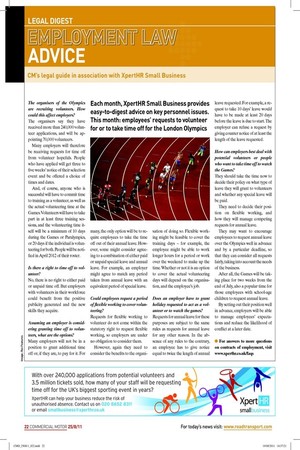CM’s legal guide in association with XpertHR Small Business
Page 19

If you've noticed an error in this article please click here to report it so we can fix it.
The organisers of the Olympics are recruiting volunteers. How could this affect employers?
The organisers say they have received more than 240,000 volunteer applications, and will be appointing 70,000 volunteers.
Many employers will therefore be receiving requests for time off from volunteer hopefuls. People who have applied will get three to ive weeks’ notice of their selection event and be offered a choice of times and dates.
And, of course, anyone who is successful will have to commit time to training as a volunteer, as well as the actual volunteering time at the Games. Volunteers will have to take part in at least three training sessions, and the volunteering time itself will be a minimum of 10 days during the Games or Paralympics, or 20 days if the individual is volunteering for both. People will be notiied in April 2012 of their roster.
Is there a right to time off to volunteer?
No, there is no right to either paid or unpaid time off. But employers with volunteers in their workforce could beneit from the positive publicity generated and the new skills they acquire.
Assuming an employer is considering granting time off to volunteers, what are the options?
Many employers will not be in a position to grant additional time off or, if they are, to pay for it. For many, the only option will be to require employees to take the time off out of their annual leave. However, some might consider agreeing to a combination of either paid or unpaid special leave and annual leave. For example, an employer might agree to match any period taken from annual leave with an equivalent period of special leave.
Could employees request a period of �exible working to cover volunteering?
Requests for lexible working to volunteer do not come within the statutory right to request lexible working, so employers are under no obligation to consider them.
However, again they need to consider the beneits to the organi sation of doing so. Flexible working might be feasible to cover the training days – for example, the employee might be able to work longer hours for a period or work over the weekend to make up the time. Whether or not it is an option to cover the actual volunteering days will depend on the organisation, and the employee’s job.
Does an employer have to grant holiday requested to act as a volunteer or to watch the games? Requests for annual leave for these purposes are subject to the same rules as requests for annual leave for any other reason. In the absence of any rules to the contrary, an employee has to give notice equal to twice the length of annual leave requested. For example, a request to take 10 days’ leave would have to be made at least 20 days before the leave is due to start. The employer can refuse a request by giving counter notice of at least the length of the leave requested.
How can employers best deal with potential volunteers or people who want to take time off to watch the Games?
They should take the time now to decide their policy on what type of leave they will grant to volunteers and whether any special leave will be paid.
They need to decide their position on lexible working, and how they will manage competing requests for annual leave.
They may want to encourage employees to request annual leave over the Olympics well in advance and by a particular deadline, so that they can consider all requests fairly, taking into account the needs of the business.
After all, the Games will be taking place for two weeks from the end of July, also a popular time for those employees with school-age children to request annual leave.
By setting out their position well in advance, employers will be able to manage employees’ expectations and reduce the likelihood of conlict at a later date.














































